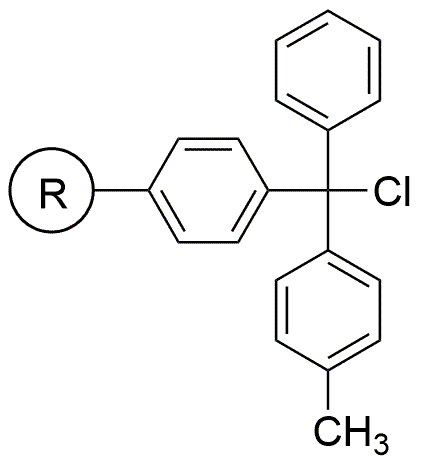4-Methyltrityl chloride resin is widely utilized in research focused on
- Solid-Phase Peptide Synthesis: This resin serves as a key support for synthesizing peptides, allowing for efficient attachment and release of peptide chains, which is crucial in drug development.
- Organic Synthesis: It is employed in various organic reactions as a protective group, helping chemists to selectively modify specific functional groups without affecting others.
- Analytical Chemistry: The resin is used in chromatography for separating and purifying compounds, enhancing the accuracy of analytical results in research labs.
- Bioconjugation: Its reactive sites facilitate the attachment of biomolecules, making it useful in the development of targeted drug delivery systems and diagnostics.
- Polymer Chemistry: The resin can be utilized in creating custom polymers with specific properties, catering to diverse applications in materials science.
General Information
Properties
Safety and Regulations
Applications
4-Methyltrityl chloride resin is widely utilized in research focused on
- Solid-Phase Peptide Synthesis: This resin serves as a key support for synthesizing peptides, allowing for efficient attachment and release of peptide chains, which is crucial in drug development.
- Organic Synthesis: It is employed in various organic reactions as a protective group, helping chemists to selectively modify specific functional groups without affecting others.
- Analytical Chemistry: The resin is used in chromatography for separating and purifying compounds, enhancing the accuracy of analytical results in research labs.
- Bioconjugation: Its reactive sites facilitate the attachment of biomolecules, making it useful in the development of targeted drug delivery systems and diagnostics.
- Polymer Chemistry: The resin can be utilized in creating custom polymers with specific properties, catering to diverse applications in materials science.
Documents
Safety Data Sheets (SDS)
The SDS provides comprehensive safety information on handling, storage, and disposal of the product.
Product Specification (PS)
The PS provides a comprehensive breakdown of the product’s properties, including chemical composition, physical state, purity, and storage requirements. It also details acceptable quality ranges and the product's intended applications.
Certificates of Analysis (COA)
Search for Certificates of Analysis (COA) by entering the products Lot Number. Lot and Batch Numbers can be found on a product’s label following the words ‘Lot’ or ‘Batch’.
Numéro de catalogue
Numéro de lot/série
Certificates Of Origin (COO)
This COO confirms the country where the product was manufactured, and also details the materials and components used in it and whether it is derived from natural, synthetic, or other specific sources. This certificate may be required for customs, trade, and regulatory compliance.
Numéro de catalogue
Numéro de lot/série
Safety Data Sheets (SDS)
The SDS provides comprehensive safety information on handling, storage, and disposal of the product.
DownloadProduct Specification (PS)
The PS provides a comprehensive breakdown of the product’s properties, including chemical composition, physical state, purity, and storage requirements. It also details acceptable quality ranges and the product's intended applications.
DownloadCertificates of Analysis (COA)
Search for Certificates of Analysis (COA) by entering the products Lot Number. Lot and Batch Numbers can be found on a product’s label following the words ‘Lot’ or ‘Batch’.
Numéro de catalogue
Numéro de lot/série
Certificates Of Origin (COO)
This COO confirms the country where the product was manufactured, and also details the materials and components used in it and whether it is derived from natural, synthetic, or other specific sources. This certificate may be required for customs, trade, and regulatory compliance.


